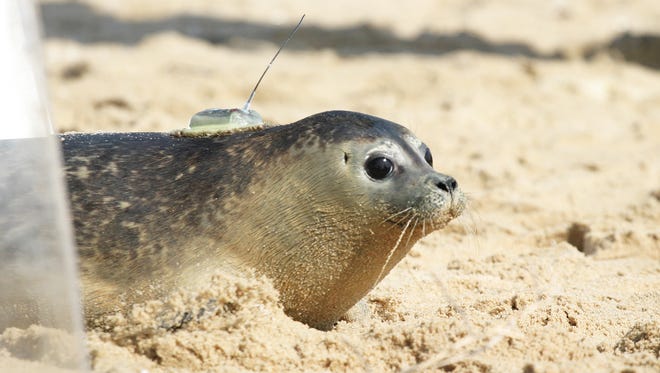Officials: Back off seals, contact harms migrating animals

It's that time of the year when one of the public's favorite wildlife visitors stops by to hit the beach.
Seals are migrating along the Atlantic coast between February and late April, and sightings of the animals have already been reported on Delmarva.
Seals are known to stop to rest on the beaches during their long journey, according to MERR, the Marine Education, Research & Rehabilitation Institute in Lewes. But researchers want to remind the public that they are wild animals, and people should keep their distance while observing them.
Delaware residents should report seal sightings to MERR, Executive director Suzanne Thurman said. She emphasized the need for people to keep their distance from the seals. She said that Federal law requires that people and their pets keep a minimum distance of 150 feet from a seal.
READ MORE: Seal swims miles, crosses road in Delaware
"It is physically normal for seals to get out of the water," she said. "It's necessary for them to rest and to sleep."
MERR estimates that there are approximately 200 sightings in Delaware every year, with about half of those on beaches, the rest in the water. Fewer than a dozen typically need intervention.
Thurman said it is important for people to report seal sightings, so that MERR personnel can assess the animals' condition. If they are ill or injured, or if they are in a location that could cause harm to the animal, personnel can rescue and treat the animal before returning it to the water.
"It happens (here) infrequently, but we do see them," said Angela Baldwin, park manager for the Assateague Island State Park. "It's not a regular thing, you couldn't plan a trip around it."

Baldwin said that there is always a lot of local interest when a seal is spotted, but the public should exercise caution when approaching the animals.
"A lot of times they're just resting, but occasionally they're ill," Baldwin said. "We can report them to the Maryland Marine Animal Stranding Program, and they send trained volunteers to take the animal. Sometimes if needed, they transport the animal to rehab for treatment."
The program is administered by the Maryland Department of Natural Resources and the National Aquarium in Baltimore. Occasionally, seals are released back into the water off Delmarva thanks to these programs. In 2015, about 550 people turned out to see Lily the seal was released back into the wild at Assateague. Megatron, a harbor seal was released off of Ocean City in May 2016.
MORE: Lily the seal released back into the wild
MORE: Megatron the seal released into wild
"It's most important to keep away from the animals and to keep pets away," Baldwin said. "They're cute and people think they're harmless, but they can bite and might carry disease."
Thurman said that untrained individuals or their pets who get too close can lead to dire consequences.
"They are naturally afraid of people, and people getting too close is very stressful to them," she said. "They do have the potential to transmit disease if they are not healthy."
Thurman said that seals have teeth very much like dogs. While they will try to escape to the water first, if they feel threatened or are cornered, they may attack. They will not pursue a perceived attacker, but will try to drive them away so that they can escape.
"If someone were to handle a seal, they're not only breaking a federal law, but they will so traumatize the animal that it could cause a threat to the seal's life," she said.
Feeding the animals is strongly discouraged, because seals will become accustomed to being fed.
"They are not cold and they are not hungry. We don't want them to become accustomed to human presence," Thurman said. "Look but don't touch. They are marvelous to watch and they're beautiful animals. We want people to help us to keep them as safe as they can."
What to do
If you see a seal on the beach, report it to the correct organization for your state.
In Maryland, the Maryland Department of Natural Resources Stranded Marine Animals hotline is 1-800-628-9944.
In Delaware, the Stranded Seals hotline at the Marine Education, Research & Rehabilitation Institute is 1-302-328-5029.